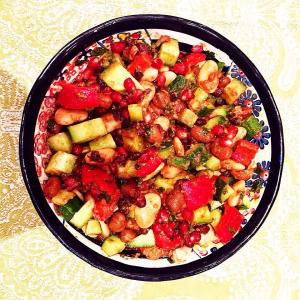The headlines recently have been presenting a pretty bleak picture of our society’s relationship with food. It feels like we are all stuck between a rock and a hard place – we either give over to a life of macdonalds and couch potato-ing (yes, it’s a verb) or constantly obsess over food to the point where we’re counting calories in toothpaste.
Part of the problem is that, seeing as nearly all basic human responsibilities have been replaced with technology, modern life makes it all-too easy to live a sedentary lifestyle. From the invention of the wheel to do our heavy lifting for us, we’ve developed tools to replace almost every physical task. While robots do all our foraging, building, making and cleaning, we have nothing to do but waste our days in front of screens. I mean, they even invented a remote so we don’t have to get up to watch TV. Heck, just the thought of walking to the kitchen to get your second tub of ben and jerrys can be exhausting.
With this increasing reliance on tools and technology, exercise has been taken out of our daily routines, meaning we have to make a huge effort in order to lead an active lifestyle. The lack of exercise combined with an excess of unhealthy foods makes being healthy a constant battle. On top of that, as Western-living seemingly guides us toward obesity, not only do we have to make the conscious decision to be eat right, but we then have to deal with temptation on a daily basis. This means that the dichotomy between fat and skinny is ever-expanding. Once you choose to be healthy it’s very easy to become obsessed. Orthorexia Nervosa is the newest eating disorder, where people become excessively preoccupied with eating healthily to the point where they fear foods perceived to be unhealthy. There have been an increasing number of cases of health bloggers and instagramers who, with good intentions, begin a healthy journey that subsequently becomes a life-destroying illness.
Although these may be extreme cases, it is quite difficult to engage in a healthy lifestyle without comparing yourself to the perfect fitspo community who appear to eat only vegetables and wouldn’t dream of sacking off a gym day. It really feels like our relationship with food is broken. We either ignore the effects of diet on physical and psychological wellbeing and eat what we want, which will almost inevitably result in obesity and or/illness. Or on the flipside, we are conscious of our weight and the way in which diet and exercise can effect us, which leads to obsession and psychological distress.
Obesity or disordered eating, the choice is pretty bleak. Of course this is a gross simplification of something that isn’t so black and white. I like to believe that there is a middle ground – exercising and eating right without letting it control your life.
The key, I think, is to not strive for perfection. Whatever the opposite is to an all-or-nothing approach, (everything in moderation?), do that. If you’re overcome with guilt a having one square of dark chocolate or spend your entire work-out calculating how many calories you’re burning off, you’ve gone too far. I’ve even read of health foodies documenting their guilt at eating too much fruit. If you feel this level of obsession happening to you, take a step back and acknowledge that no one is perfect. Even the slender yogi’s whose instagram feed is inundated with photos of green juice and lycra have off days.
Finding the middle ground isn’t so much about finding the perfect workout or diet as it is about finding the right mindset.
Try a 70-30 balance, being healthy 70% if the time and doing what makes you happy 30% of the time. Most importantly, for the lifestyle to stick without feeling like a chore or obsession, you have to enjoy it. If you hate the taste of kale, stop eating it. If you love reese’s peanut butter cups, don’t give them up. If you try to take up running and find yourself dreading each run, don’t hesitate to find a different form of exercise that you actually enjoy. There are many ways of being healthy and no one way works for everyone. It takes time and effort to try different things but slowly you’ll get to know what works for you and find your healthy groove.
I’ve been trying this for about a year and have still not quite found the middle ground. As soon as I start to compare myself to fitter, slimmer, healthier people and try to adopt their habits, I take one step back from reaching the optimum balance.
But what I have learnt is that there is more to life than having a perfect exercise and nutrition plan. When you find the middle ground life becomes less guilt-ridden. Food tastes better, cooking is funner and exercise is more fulfilling. But most importantly, an enormous load of stress and relief is lifted.
Mexican Style corn-on-the-cob:

Ingredients
1 lime
2 corn on the cob
Handful of chopped coriander
1 tablespoon feta
1 teaspoon capers
1 tablespoon olive oil
1 chilli pepper
- Boil the corn on the cob for 10-15 mins.
- Meanwhile finely chop the coriander and chilli, mix in a bowl with olive oil, capers, lime juice, salt and pepper.
- Drain the corn on the cob. To blacken them, hold with tongs over the hob for about 30seconds until black, turning so each part changes colour.
- On a plate, drizzle the mixture over the corn on the cob and top with crumbled feta, salt and pepper.



 No-bake Blackberry and lemon tarts:
No-bake Blackberry and lemon tarts:










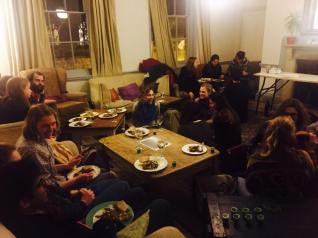

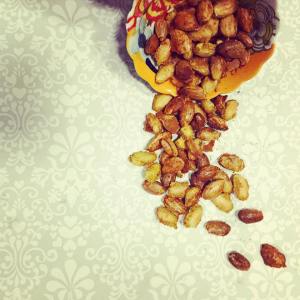
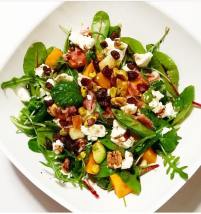





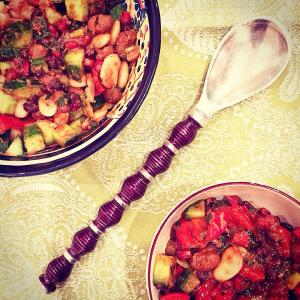




 Sweet chilli and coriander bean stew:
Sweet chilli and coriander bean stew: